
Humko Deewana Kar Gaye is a 2006 Indian Hindi-language romantic drama film directed by Raj Kanwar, produced by Raj Kanwar, Bhushan Kumar and Krishan Kumar and starring Akshay Kumar, Katrina Kaif, Bipasha Basu, and Anil Kapoor in lead roles. Bhagyashree, Vivek Shauq, Shernaz Patel and Manoj Joshi also star in supporting roles. The film was produced by the Indian music company, T-Series and Inderjit Films Combine. The movie's score and soundtrack were composed by Anu Malik, while Himesh Reshammiya was invited as a guest composer to compose only one song. with lyrics by Sameer. The film was released on 14 April 2006. The music of the film was released on 4 February 2006.

Pachadlela is a 2004 Indian Marathi-language comedy horror film directed and produced by Mahesh Kothare under the banner of Jenna Films International, the film stars Bharat Jadhav, Shreyas Talpade, Laxmikant Berde, Vandana Gupte, Dilip Prabhawalkar. The music is composed by Anil Mohile and VFX by Binoy Samuel.
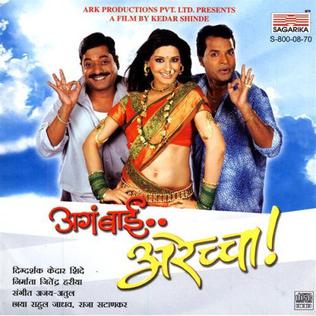
Aga Bai Arrechha! is a 2004 Indian Marathi comedy drama film by director Kedar Shinde loosely based on the Hollywood film What Women Want. It was released in 2004. The film highlights the life and the problems of a common man living in a metropolitan city like Mumbai. His greatest desire in life is to answer the question "What do women want?" He is then blessed by the Kuldevi of his village and gets a special "ear" for the internal dialogues of the women around him. It highlights his transition from a frustrated individual to someone who is happy, content and in charge of his life. The film also had a sequel titled Aga Bai Arechyaa 2, which was not a commercial success.
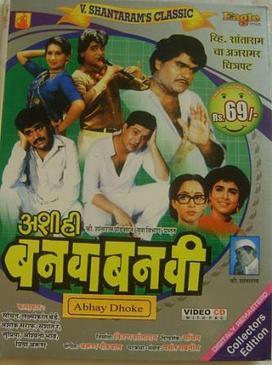
Ashi Hi Banwa Banwi is a 1988 Indian Marathi-language comedy buddy film directed by Sachin Pilgaonkar and produced by Kiran Shantaram under the production banner of V. Shantaram Productions. Widely regarded as one of the greatest comedy films in Marathi cinema industry, it stars an ensemble cast of Ashok Saraf, Sachin Pilgaonkar, Laxmikant Berde, Siddharth Ray, Ashwini Bhave, Supriya Pilgaonkar, Priya Arun, Nivedita Joshi, Nayantara, Viju Khote, and Sudhir Joshi.
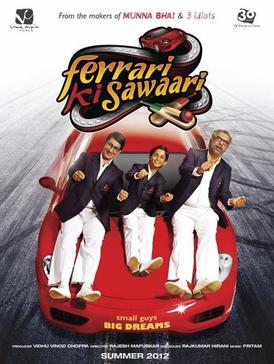
Ferrari Ki Sawaari is a 2012 Indian Hindi-language sports comedy drama film written and directed by Rajesh Mapuskar and produced by Vidhu Vinod Chopra under the production banners of Eros International and Vinod Chopra Films. The film was released in India on 15 June 2012 and stars an ensemble cast of Sharman Joshi, Boman Irani, Ritvik Sahore, Vidya Balan, Paresh Rawal, Seema Bhargava Pahwa, Deepak Shirke, Aakash Dabhade, Vijay Nikam, Nilesh Diwekar and Bhalchandra Kadam.
Encounter: The Killing is a 2002 Indian Bollywood film produced and directed by Ajay Phansekar. It stars Naseeruddin Shah, Dilip Prabhavalkar and Tara Deshpande in pivotal roles.
Anand Abhyankar was an Indian Marathi film, television and theatre actor. He starred in films such as Spandan (2012), Balgandharva (2011), Matichya Chuli (2006), Vaastav (1999) and Jis Desh Mein Ganga Rehta Hain. On television, he is known for his roles in Mala Sasu Havi, Taarak Mehta Ka Ooltah Chashmah, Fu Bai Fu, Avaghachi Sansar and Asambhav. Abhyankar died on 24 December 2012 in a car crash.

Sanjay Surkar was a Marathi film director. He won three National Film Awards for the films Rao Saheb (1996), Tu Tithe Mee (1998) and Gharabaher (1999) in Best Feature Film in Marathi category. Along with films, Surkar had also worked in television and theatre.

Sunil Barve is an Indian film, television and theatre actor, singer and producer. Predominantly working in Marathi, he has also worked in Hindi and Gujarati entertainment industry. He is also a radio jockey. He started doing small roles for serials and theatres and starred in several Marathi films and serials. After 25 years in the industry, he launched an initiative named Herbarium through his production company Subak to "bring back the lost glory of Marathi musical plays".

Zapatlela 2 is a 2013 Indian Marathi-language horror comedy thriller film written and directed by Mahesh Kothare. Produced by Kothare and Kothare Vision, it was distributed by Viacom18 Motion Pictures. A sequel to the 1993 film Zapatlela, it stars Adinath Kothare, Sonalee Kulkarni, Mahesh Kothare, Makarand Anaspure, Sai Tamhankar, Madhu Kambikar, Vijay Chavan, Deepak Shirke, and features Dilip Prabhavalkar providing the voice for Tatya Vinchu. This film is notable for being the first Marathi movie shot entirely with a 3D camera. Mahesh Kothare has also announced plans for a third installment, set for theatrical release in 2025.
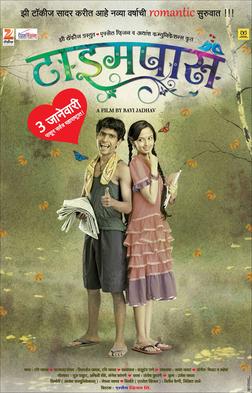
Timepass is a 2014 Indian Marathi-language romantic drama film about teenage love set in the 1990s between Dagadu and Prajakta. It also stars Bhalchandra Kadam, Vaibhav Mangle, Bhushan Pradhan And Urmila Kothare. It was directed by Ravi Jadhav, who has provided prior hits like Balak-Palak, Balgandharva, and Natarang.

Zapatlela (transl. Possessed) is a 1993 Indian Marathi-language horror comedy film directed and produced by Mahesh Kothare under Jenma Films International. The film stars an ensemble cast of Mahesh Kothare, Laxmikant Berde, Pooja Pawar, Kishori Ambiye, Madhu Kambikar, Jairam Kulkarni, Vijay Chavan, Ravindra Berde, Raghavendra Kadkol, Bipin Varti, and Dilip Prabhavalkar made a cameo appearance and provided the voiceover for the puppet Tatya Vinchu in the film. The practical effects for the puppet were created by Ramdas Padhye, a renowned ventriloquist and puppeteer. A sequel titled Zapatlela 2 was released 20 years later in 2013 in 3D format. The movie was also dubbed in Hindi as Khilona Bana Khalnayak.
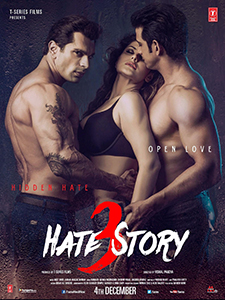
Hate Story 3 is a 2015 Indian Hindi-language erotic thriller film directed by Vishal Pandya. Produced by T-Series, it stars Sharman Joshi, Karan Singh Grover, Zareen Khan and Daisy Shah, with Priyanshu Chatterjee in a pivotal role. Written by Vikram Bhatt, Anupam Saroj and Madhuri Banerji, the film is part of the Hate Story film series. The film was released on 4 December 2015 and was a box office success.

Murder Mestri is a 2015 Marathi film directed by Rahul Jadhav. Starring Vandana Gupte, Dilip Prabhavalkar, Kranti Redkar, Sanjay Khapre, Manasi Naik, Vikas Kadam, and Hrishikesh Joshi. The movie was released on 10 July 2015.

Chuk Bhul Dyavi Ghyavi is a Marathi Television romantic comedy produced by Manava Naik and directed by Swapnanil Jaykar. It started airing on Zee Marathi from 18 January 2017 and ended on 29 July 2017. The show was aired every Wednesday to Saturday at 9:30 pm. It stars Dilip Prabhavalkar, Sukanya Kulkarni, Nayana Apte, Priyadarshan Jadhav and Sayali Phatak in lead roles.
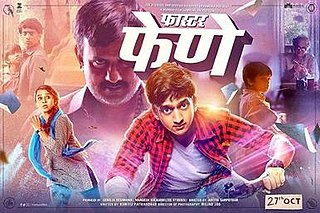
Faster Fene is a 2017 Marathi-language crime thriller film directed by Aditya Sarpotdar The film stars Amey Wagh in and as Faster Fene, based on the character created by Bhaskar Ramachandra Bhagwat and also stars National Award winning actor Girish Kulkarni in a negative role. Supporting star cast includes Parna Pethe, Chinmayi Sumit, Dilip Prabhavalkar and Siddharth Jadhav in supporting roles. Dilip Prabhavalkar plays the role of Bhaskar Ramachandra Bhagwat.

Panchak (transl. Quintet) is a 2024 Indian Marathi language comedy drama film written and directed by Rahul Awate and Jayant Jathar and produced by Madhuri Dixit-Nene along with her husband, Dr. Shriram Nene, under RnM Moving Pictures. The film features an ensemble cast of Adinath Kothare, Dilip Prabhavalkar, Bharati Achrekar, Anand Ingale, Tejashri Pradhan, Satish Alekar, Nandita Patkar, Sampada Kulkarni and Deepti Devi. The story revolves around a family with a fear of superstition and death.















